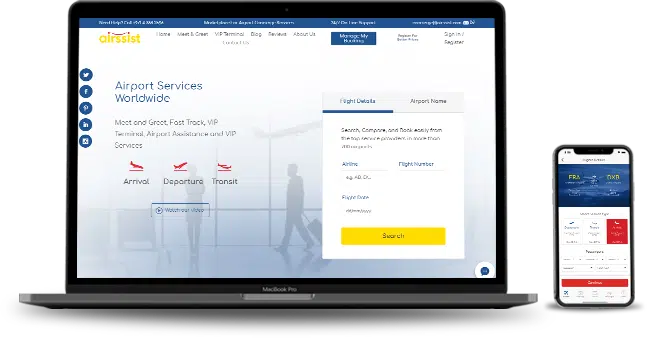Table of Contents
You might be looking for expenses that you can reduce while you work on your company’s budget for the coming year. Your trip budget is one item that can tempt your cost-cutting. After all, how much value are you really getting for your business travel dollar when there are so many free or inexpensive web-based alternatives available for anything from client meetings to employee training?
So, what are the advantages of business travel, and how can businesses make sure their investment is profitable?
What Is the ROI of Business Travel?
Simply expressed, return on investment (or ROI) is a performance measure used to assess an investment’s effectiveness. It measures the amount of return (or benefit) received in relation to the investment’s cost. Business travel may be seen as a capital expenditure that “is expected to produce advantages to corporate productivity,” according to the white paper from Oxford Economics USA.
Despite being a phrase used in finance, return on investment (ROI of business travel) in the context of corporate travel management refers to the possibility to forge relationships with diverse groups that are related to the company’s profit and loss. Technology advancements have transformed every aspect of business, from emails to conference calls, in the world we live in.
What Advantages Can Corporate Travel Provide To A Business?
It Facilitates Gaining New Clients
When it comes to gaining clients, nothing quite compares to in-person interactions. According to reports from Oxford Economics USA and the World Travel & Tourism Council, business travelers and corporate leaders predict a greater conversion rate following an in-person meeting.
Many people won’t likely be surprised by this claim. Even after a few Zoom meetings, it’s obvious that reading body language and other non-verbal clues make it much simpler to establish trust and negotiate conditions.
Investment in business travel will remain essential for this reason alone, especially when trying to complete significant agreements.
It Is Important For Maintaining Professional Connections
But as we all know, running a business involves more than just bringing in new customers. Maintaining consumer relationships also requires face-to-face communication. Most of the time, a phone call simply isn’t sufficient for everything, including polite check-ins and resolving any difficulties.
To show appreciation and a level of respect for the partnership, take the time and bear the expense of travel to meet with clients in person.
According to surveys, corporations ultimately lose money when they try to decrease the costs of business travel. Executives predicted that if they stopped holding in-person meetings, up to 38% of their clients may switch to a rival, costing them 37% less in annual revenue.
https://airssist.com/hidden-cost-business-travel/
It Offers Chances To Network
Business travel promotes collaboration and relationship building within a larger industry environment in addition to the advantages of team building within your company. Professionals can stay current on new advancements while networking with potential clients or establishing new relationships by attending conferences and trade events.
According to a report by Oxford Economics USA, up to 20% of survey respondents said they acquired new clients as a result of attending trade fairs, and 48% said that finding new vendors was another important reason they attended.
It Acts As a Motivating Factor
Business travel can serve a variety of purposes, as we’ve already seen. How employees gather together is evolving as more businesses adopt remote or hybrid working arrangements.
The time when hot startups were the only ones eligible for regular offsite incentives is long gone. To take advantage of our new normal, more and more firms are constantly revamping their internal meetings.
Bringing together teams from various locations in a motivating location might meet a variety of business needs. Remote working teams can be re energized and fresh ideas can come to the fore by combining crucial updates, in-person brainstorming sessions, and a few enjoyable team-building activities in new environments.
It Has Global Effects
According to a 2020 Harvard University study, travel has significant effects on whole countries in addition to its advantages for specific enterprises. A country’s GDP and the volume of incoming business travelers are positively correlated, according to research done with the MasterCard Center for Inclusive Growth.
This economic expansion was ascribed to both tourists’ domestic spending and the “know-how” that was disseminated by business travelers and assisted industrial operations in becoming more profitable. Even the potential effects of stopping business travel between particular nations were calculated by the poll.
As a result of all these advantages, both small-scale and large-scale, business travel is probably here to stay. The Global Business Travel Association (GBTA) has predicted that business travel spending will return to its per-pandemic levels by 2024, a year faster than projected, despite the availability of technology like Zoom and Skype.
How Targeted Business Travel Boosts Sales, Productivity, and Cost Savings
Targeted business travel is essential for expanding networks, acquiring new clients, and nurturing existing relationships. Despite technological advancements, face-to-face interactions remain invaluable. Strategic business travel boosts sales, productivity, and cost savings, making it a vital component of corporate operations.
Investing in business travel can seem counterintuitive in today’s digital age. However, evidence suggests it can be a strategic driver of increased sales, enhanced productivity, and significant cost savings.
Consider the numbers: a study by Oxford Economics revealed that companies recoup $12.50 for every $1 spent on business travel, and Salesforce saw a 44% faster deal closure rate with face-to-face client meetings.
Boosting productivity is another advantage. 73% of business travelers in a GBTA survey reported increased productivity after attending industry events, and Google’s “Innovation Week” saw a 20% jump in project completion after bringing employees together.
Even cost savings are within reach. The McKinsey Global Institute estimates 8-13% savings through improved collaboration and knowledge sharing from business travel, and GE saved a staggering $500 million annually by using video conferencing for routine meetings, reserving travel for strategic purposes.
Business Travel Success Stories: Across Industries and Goals
While some may question the value of business travel in the digital age, numerous companies across diverse industries have leveraged it to achieve tangible results. Here are some inspirational examples:
1. Medical Technology: Medtronic, a medical device manufacturer, aimed to accelerate product development by fostering collaboration between engineers in different countries. They organized “innovation sprints,” bringing teams together for intensive face-to-face sessions at international locations. This resulted in a 20% reduction in development time for new products.
2. Retail: Lululemon, a yoga apparel brand, wanted to strengthen relationships with key influencers and showcase their latest collections. They invited bloggers and media personalities on immersive trips to yoga retreats led by brand ambassadors. This generated significant positive social media buzz and increased brand awareness.
3. Consulting: Bain & Company, a management consulting firm, aimed to improve client relationships and engagement. They implemented a program where consultants visit clients on-site for intensive workshops and problem-solving sessions. This resulted in higher client satisfaction scores and increased repeat business.
4. Manufacturing: Boeing, an aerospace giant, needed to troubleshoot production issues at a new factory in China. A team of engineers traveled to the site to collaborate with local employees and identify the problems firsthand. This resolved the issues quickly and prevented costly delays.
5. Non-profit: Doctors Without Borders needed to train medical professionals in remote areas with limited internet access. They organized workshops and training sessions led by experienced doctors, traveling to various locations around the world. This improved healthcare delivery in underserved communities.
How Can Companies Maximize The Value Of Their Corporate Travel Budgets?
- Facilitate the booking of travel
- Automate and integrate
- Expenses’ transparency should be improved

Facilitate The Booking Of Travel
Accelerating the booking process is the simplest approach for organizations to increase the effectiveness of their travel. Corporate traveler may assemble all components of their itinerary in one easy-to-use dashboard with a travel management application rather than skimming through multiple websites in search of the best deal.
Are you traveling for a business trip, business meeting, conference, or exhibition? Do want to have a productive passage at the airport and gain time to finish some tasks and meetings instead of waiting in long queues?
The airssist IOS & Android app and www.airssist.com both offer simple and quick online booking. airssist offers a list of several service packages at the airport, allowing you to choose the packages that best suit your clients. You can search for corporate airport concierge services by entering your flight information or by selecting the airport name.
Automate And Integrate
Integrating corporate travel regulations and automating approvals are two ways that travel managers can further improve the booking process. Booking solutions that enhance employee experience and free up management for other crucial activities can be set up in under two minutes.
A travel management application can quickly approve itineraries that are within company budgets by entering parameters from your corporate travel policy and marking those that need additional attention.
With this strategy, business travelers may choose the business solutions that best suit their specific requirements, whether it’s a hotel with an on-site fitness center or a flight that gets them home in time to pick up the kids from school. Giving team members choice over their accommodations enhances their experience on work trips and boosts employee retention.
Expenses’ Transparency Should Be Improved
Report generation might waste time and money for travel managers if a system is not effective. Budgets can be broken down by department, location, and even individual employees by employing particular corporate travel solutions. By analyzing travel expenses and revenue, managers may quickly gain real-time insights and determine the ROI of business travel.
Modern systems will combine all providers’ travel charges into a single invoice and provide services for VAT reclaim. These enable companies to save an additional 25% on their annual travel costs by providing tax-ready receipts and emphasizing any relevant expenses you might be skipping.
Sit back and relax while we handle the process of reclaiming the VAT you paid in the country you visited thanks to airssist. contact us
Best Airport Services Worldwide for Corporate & Business Travelers
Waiting in long queues at security checkpoints, getting lost in crowded airports, and stress… Yes, if you don’t book airssist airport concierge services to make your travel hassle-free and easier, you’ll face all of these issues and more when you arrive at the airport.
Book our safe travel concierge to get the most out of your company’s travel budget by making your trip not only memorable but also enjoyable and productive. The goal of airssist’s business travel concierge services at the airport is to make your trip more comfortable.
The Bottom Line
Remember the strength of the benefits of corporate travel when you are looking for effective strategies to improve your ROI for business travel ratio, regardless of whether these benefits result in short-term profitability or long-term sustainability.
Make use of the regular travelers in your organization to help you learn more about these advantages and be sure to communicate those to your firm’s higher-ups. Utilize data to manage the company’s business travel investments and to understand the needs and preferences of passengers. However, keep in mind that some intangible benefits can also be realized.
Note: Please note that the information on this page is generic & subject to change due to fluctuations in airport services. Kindly confirm service availability with our team, as offerings may vary daily.
 French | Français
French | Français Spanish | Espana
Spanish | Espana German | Deutch
German | Deutch Arabic | العربية
Arabic | العربية Chinese | 中文(简体)
Chinese | 中文(简体)  Japanese | 日本語
Japanese | 日本語 




